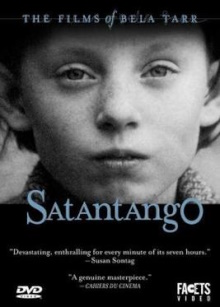At over seven hours long, this is by far the longest film we’ve watched. Even staggering it out over the course of a week, experiencing it in its entirety was quite a trial especially as it is an artistic film that isn’t always easy to understand and is entirely in black and white. I added this to my list because Béla Tarr is perhaps Hungary’s greatest director and this title often named among the greatest films ever made. The themes of desolation and hopelessness are obvious but it’s hard for someone unfamiliar with Hungary to place the circumstances under which the story takes place. I will say that this is easily one of the most pessimistic films I’ve ever encountered and it really is unique. Sitting through seven hours is still a big ask though.
The residents of an isolated village in Hungary are uneasy after the failure of their collective farm. One villager Futaki is having an affair with the wife of another man, Schmidt, when he overhears him conspiring to run away with their money. Meanwhile the de facto head of the village Irimiás is heading back after being interrogated by the police. They villagers thought he was dead and the news of his impending arrival upsets all of their plans. The owner bar owner lashes out about how Irimiás is going to ruin everything and his customers indulge themselves in a night of drunken revelry. A little girl Estike is neglected by her mother and cheated out of her money by her older brother Sanyi who works for Irimiás. She tortures her pet cat to death and numbly looks on at the drunken adults in the bar. Meanwhile a grossly overweight man called the Doctor observes many of these events from the window of his house and jots them down in his notebooks. He is forced to leave his house only when he runs out of his brandy.
The primary difficulty here is that we don’t know the background context. From what I understand this takes place just after the collapse of Communism in Hungary. The new government is weak, enterprises are failing everywhere, no one knows what is going to happen next and con men who are brazen enough can make enormous fortunes. At the same time, there are religious themes present that I can’t account for. The character of Irimiás at times resemble a false prophet and he reacts dramatically to visions, a sudden fog bank for example, by kneeling down in the dirt which everyone else takes to be mundane. The characters sometimes react to strange sounds or sights that we the audience don’t perceive. I don’t fully understand what the deal is with the Doctor either. I guessed that he was an informant for the secret police but it’s also possible that he represents the more educated class making observations on human nature and Hungarian society. There’s definitely a cultural gulf that impedes my appreciation of everything that goes on in here.
Still the gist is obvious enough. This is a portrait of stark and unrelenting hopelessness, of a society with no moral center, of a people who wait around for someone to come along and tell them what to do next. I mean I’ve watched plenty of films with very dark and pessimistic takes but it’s quite something to see even a child embrace nihilism. The film is so very long because so much of it is composed of long takes in which the characters do nothing or almost nothing. So you’ll them trudging through mud in the rain, and it’s almost always raining, to get from one place to another, or waiting in a hallway and the scene just goes on and on and on. It’s not much that it’s boring than that it feels pointless and gets increasingly uncomfortable to watch. This is especially noticeable in the bar scene in which the villagers keep going through the motions of their revelry, including idiotic antics like balancing a loaf of bread on a man’s head, and you wish the scene would stop already. The camera tracking is always perfectly composed and choreographed and the cinematography is always exquisite. The intent is always to make the audience feel just what kind of hell life in this village is like and why everyone numbs themselves with alcohol and cigarettes.
There’s no doubt that this deserves being hailed as a masterpiece. Every shot and every scene serves a purpose and I haven’t even gone into the unusual structure that supposedly is patterned after a tango dance. That said, seven hours is a huge investment of time and I’m not sure it’s worth the effort. Doing it once is an interesting novelty but I would hesitate to do it again for another film. Tarr is certainly a masterful director and I will likely watch more of his work. Thankfully none of the rest are as long as this one.

2 thoughts on “Sátántangó (1994)”